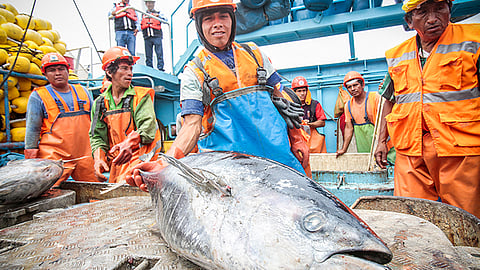

"Our active participation will contribute to better positioning our producers in international markets and strengthening fisheries governance at the global level," said the Peruvian Minister of Production.
Photo: Sanipes.
During its 20th session, Peru was elected to chair the Sub-Committee on Fish Trade (SC-FT) of the Committee on Fisheries (COFI) of the Food and Agriculture Organization of the United Nations (FAO), which has just released its Review of the state of world marine fishery resources - 2025, the most comprehensive and participatory global assessment of marine fish stocks to date.
As explained by the Food and Agriculture Organization of the United Nations on its website, the COFI Sub-Committee on Fish Trade (COFI:FT) serves as a platform for discussions among FAO Members about the technical and economic dimensions of international trade in fisheries and aquaculture products, covering relevant aspects of both production and consumption.
"This international leadership is recognition of Peru's efforts to ensure the safety and sustainability of its fisheries and aquaculture resources," said Peruvian Minister of Production Sergio González Guerrero.
"We take on this challenge with the firm conviction that our active participation will contribute to better positioning our producers in international markets and strengthening fisheries governance at the global level," he added.
With this appointment, Peru becomes one of the first countries in Latin America to chair COFI:FT, consolidating its position as a regional benchmark in fisheries and aquaculture governance. It is a milestone for the country and the region, and international recognition of Peru's leadership in the responsible management of hydrobiological resources, the promotion of fair and sustainable fisheries trade, and the defense of global food security.
Peru's efforts to consolidate its position as an active and responsible player on the global fishing scene reached their peak last June when, in addition to announcing the results of its intense enforcement against illegal fishing and taking stock of its citizen education campaigns, it also took two important steps at the international level by adhering, even without being a member, to the OECD recommendation to combat IUU fishing, and also signing the United Nations Agreement on Marine Biological Diversity of Areas beyond National Jurisdiction (BBNJ Agreement).
All these measures aimed at strengthening environmental sustainability, the economic development of fishing communities, and equity in value chains were highlighted by the Peruvian delegation participating in the 20th Session of the Sub-Committee on Fish Trade, although the country had already taken steps in this direction with previous meetings, such as the one held last summer in Peru.
Likewise, Produce highlighted that this achievement was made possible thanks to the coordinated efforts of Peru's Permanent Representation to International Organizations in Rome, which promoted the country's candidacy, as well as the solid technical support provided by the Ministry of Production itself and the Peruvian National Fisheries Health Agency (Sanipes), which are responsible for the sustainability, traceability, and safety policies being implemented in fisheries and aquaculture.
Precisely, Sanipes Executive President Mónica Saavedra Chumbe thanked COFI:FT for its confidence in the country and emphasized that fishing and aquaculture are vital pillars for Peru's economic, social, and food development, not only generating employment and opportunities, but also contributing to global food security.
Produce said that Peru is taking on the task of leading the Subcommittee's work "with responsibility," promoting international cooperation and strengthening sustainable, safe, and inclusive fisheries trade for the benefit of all member states.
